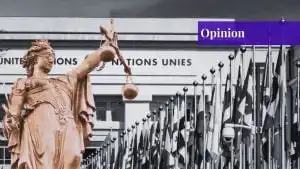On October 7th last year, Israel unleashed a gruesome genocide on Palestine and up till now, at least 40,000 people have been killed. Many countries like Iran chose to take a stricter stance against Israel whereas Pakistan’s response was quite restricted in the initial days. Pakistanis are still debating whether or not supporting the BDS movement holds any worth given that boycotting all Israeli products will negatively impact the country’s already dwindling economy.
Despite the implications, however, the standards of morality call for these boycotts, especially now when images of violence so poignant and upsetting can be seen all over social media. We seem to be divided on the impact of the BDS movement but this is not the only issue that Pakistan is divided on and it is surely not the only issue where our support is somewhat hypocritical. In fact, the disunion over the BDS movement and other matters related to the Palestinian cause is only mirroring a norm of hypocrisy within Pakistani society.
Pakistan’s selective outrage towards international issues also demonstrates our selective empathy and total apathy towards our own people. A lot has been going on in the backyard of our own home and we have chosen to turn a blind eye to those matters. Not only that, we are also trying to find the justifications for these heinous acts which is even preposterous.
These atrocities include religious and ethnic persecution, mob violence, and systematic discrimination against the minorities. These issues are not new, but rather quite longstanding as they have been around us for decades and what is happening in our country is not a clandestine story anymore. It can be said that it is noticeably our conscious choice to ignore the atrocities committed by our own people on our own people.
The greatest exemplification of our hypocrisy is the predicament of our minorities. We express solidarity with the Muslims in Palestine and India when they are persecuted, while our treatment towards our minorities is very problematic and we do not extend the same gesture of solidarity when people from our religious minorities and ethnic groups are abducted and killed if they refuse to comply.
Statistics show that almost 1,000 girls are abducted each year, forcefully converted, and are then married off to their Muslim abductors. These abductions are not the only fear and dilemma that Pakistan’s minorities live in every day. The destruction of their properties, their religious places, and their livelihoods by radical extremists has become a new norm in Pakistan. The justifications that we give for these acts are not only false but also based on our false interpretations of Islam. These justifications oppose the Islamic teachings of tolerance and respect for the heterogeneity of people and faiths.
Another testament to the deterioration of Pakistan’s religious tolerance is the persecution of the people belonging to the Shi’ite school of thought of Islam, particularly the persecution of the Hazara community, and quite recently, the Parachinar incident. The Hazaras are easier to target because of their visibly different ethnicity; therefore, their persecution has been going on for years.
However, the recent targeted killings of Shias in the Parachinar region have illustrated how divided we are as a nation. There was little to no public outcry regarding the recent incident, which shows how indifferent we have become to our internal matters which also indicates our hypocrisy as a nation. Over the years, our religious tolerance has depreciated to such a level that people prefer killing Mashal Khan, Priyantha Kumara, Nazar Masih, and many more people under the false justification of the Blasphemy law.
The exploitation and misuse of the Blasphemy Law is just another face of our hypocrisy. This law was originally made to protect the sanctity of Islam and the Holy Quran but now this law has been exploited by extremists to justify violence and persecution against all dissenting voices. The pros and cons of this law can be debated but its use as the prerogative of the state alone and not a common man is undebatable.
However, this law falling into the hands of a common citizen has bolstered a culture of impunity. We ourselves have not painted a good picture of protecting our people, and when we talk about the international humanitarian crisis, it seems deceitful and hypocritical. Pakistan’s effort to raise its voice for Kashmir and Palestine on international platforms is weak and flawed until it addresses its domestic human rights abuses.
Therefore, Pakistan must align its international advocacy of human rights with effectively advocating human rights abuses and injustices at home. Only by doing so can Pakistan add credibility to its words on international platforms; otherwise, Pakistan will always be questioned about its moral authority to talk about international issues by the global community.
If you want to submit your articles and/or research papers, please check the Submissions page.
The views and opinions expressed in this article/paper are the author’s own and do not necessarily reflect the editorial position of Paradigm Shift.
Hareem Amna graduated with a degree in applied psychology from GCUF and a post-graduation certification in clinical psychology from Kinnaird College. She is an aspiring writer focused on writing about current issues.





